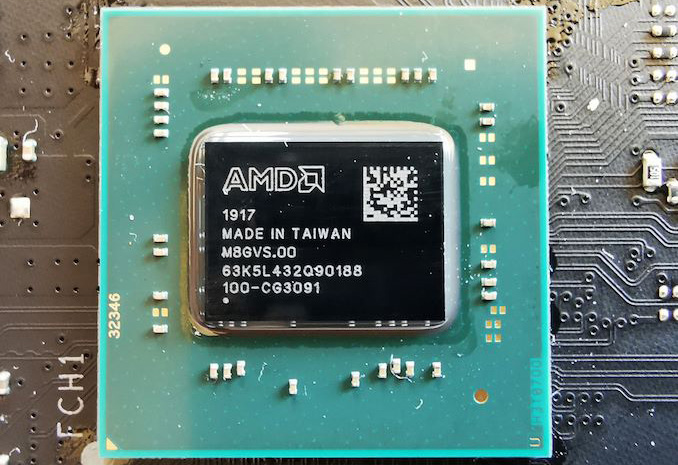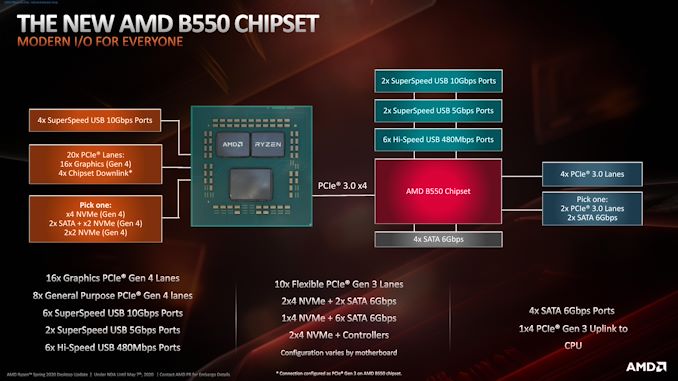AMD To Probe Potential USB Connectivity Issue on Ryzen Systems
by Gavin Bonshor on February 22, 2021 11:40 AM EST- Posted in
- Motherboards
- AMD
- Ryzen
- USB
- PCIe 4.0
- Zen 2
- Zen 3
- Ryzen 3000
- X570
- B550
- Ryzen 5000

Some AMD users have been posting on social media, including Reddit, about experiencing intermittent connectivity problems when using USB ports on their 500-series motherboards. In response, AMD has reached out through a Reddit post that it has been made aware of the connectivity issues, and is requesting more information from specific users with the issue to help them resolve it. Since this announcement, many users have been reaching out to AMD.
AMD's X570 motherboards have been readily available since July 2019, and its B550 models have been available since June 2020 and have both become well established over the course of the last year and a half. The fact that users are now having USB issues begs the question whether the issues have been present all along but are now rising above the noise, or there is something related to the longevity of these systems.
AMD 500 Series Motherboard and USB Connectivity Issues?
The most common reproduction of this issue appears to be during the use of Virtual Reality headsets such as the Oculus Rift and HTC Vive, with an intermittent connection issue being more prevalent to these users. As USB is the main method to power and communicate with VR headsets and peripherals, any dropout, even slightly to the high-powered VR applications, would instantly be highlighted. That isn't the only problem it can cause, as streaming devices and USB audio interfaces could also experience power dropouts, which could be quite noticeable, especially if doing a recording.
While AMD hasn't pinpointed the exact cause of the issue yet, it asks its users to reach out to them over on Reddit by u/AMDOfficial, which is an official support channel for AMD. Extensively combing through user comments on Reddit, it doesn't seem to be solely related just to one section of hardware. Some of the issues that users report seem to stem from the release of PCIe 4.0 graphics cards on 500 series motherboards. Reddit user u/duddy32 also states that they have been having these issues with a B450 motherboard and a Ryzen 7 3700X processor, which precede the 500-series chipset.

AMD's B550 Chipset layout, including USB connectivity.
One possible workaround touted to reduce (but importantly not completely stop) the issues is users changing the motherboards' settings from PCIe 4.0 to PCIe 3.0. Users on Reddit have been reporting although it has reduced the frequency of dropouts, it hasn't eliminated them, which could point to an issue between the USB hub controller and other parts of the chipset. Some users are also reporting the issue to be primarily on USB 2.0 ports, and some have had success by switching devices to USB 3.1 ports. It is also recommended to update the firmware to the latest AGESA version on models, which could reduce issues. Although at this point, it's possible to presume that none of the workarounds could fix these problems users are experiencing with random and intermittent USB cutouts.
Although AMD hasn't notified the reddit audience if it has been able to pinpoint the issue internally, it is asking users experiencing these issues to detail their hardware configurations and other relevant system information to allow AMD to recreate the issues on its end. AMD is also openly encouraging users to directly raise online service requests with AMD customer support to help correlate data and compare notes with other support claims to narrow down the problem potentially.

The rear panel of an X70 motherboard with USB 3.1, USB 3.0, and USB 2.0 ports.
It should be noted that not all users have experienced these issues - we've tested several dozen AMD AM4 motherboards and have used them extensively over the last 15 months, with exactly zero issues related to this. This is why this issue might only be being highlighted now - either users haven't noticed the issue, as a very slight cutout from a mouse or keyboard may not be very apparent, or they might be lucky that this issue doesn't affect them. However, enough users are coming forward with these intermittent USB connectivity issues to make the issue widespread across multiple models and processor combinations. This means the issue isn't specifically down to a certain manufacturer and looks more like an issue with AMD's chipset or how it connects from the USB hub to the chipset.
If AMD does manage to pinpoint the issue with its in-house team and collaboration of consistent data points provided by its users, it's possible a future AGESA firmware update could alleviate the issues. Of course, if it is directly related to a design and hardware problem, which could be a much tougher nut to crack for AMD.
AMD's official statement posted on 02/20/21 can be found on Reddit here - https://www.reddit.com/r/Amd/comments/lnmet0/an_update_on_usb_connectivity_with_500_series/
Related Reading
- The AMD X570 Motherboard Overview: Over 35+ Motherboards Analyzed
- The AMD B550 Motherboard Overview: ASUS, GIGABYTE, MSI, ASRock, and Others
- AMD Zen 3 Ryzen Deep Dive Review: 5950X, 5900X, 5800X and 5600X Tested
- Investigating Performance of Multi-Threading on Zen 3 and AMD Ryzen 5000
- AMD Precision Boost Overdrive 2: Adaptive Undervolting For Ryzen 5000 Coming Soon










45 Comments
View All Comments
Targon - Monday, February 22, 2021 - link
I have an Asus ROG Crosshair VI Hero with Ryzen 3900X(upgraded from the 1800X I had started with), and have not had any of these issues. Obviously, PCIe 4.0 isn't supported on first generation Ryzen motherboards.Samus - Monday, February 22, 2021 - link
No issues with any of the B550 systems I've built over the last 6-7 months. Time will tell I guess. Every board I've used was Asus, for what its worth. This could be a component (or batch of components) issue among one or many OEM's, who knows at this point. But what is interesting is no issues seem to be reported with retail systems, like those from Lenovo, HP, etc, indicating this could very well be a motherboard component issue, not a chipset\firmware issue.heickelrrx - Tuesday, February 23, 2021 - link
an Embarrassing way to screw out, USB is old standard, and while AMD busy fixing their ancient 2.0 and slightly newer 3.1 Port, Their competitor already perfecting Thunderbolt, even contributing it's technology to USB ForumQA please QA QA QA
Gigaplex - Tuesday, February 23, 2021 - link
"The fact that users are now having USB issues begs the question whether the issues have been present all along but are now rising above the noise, or there is something related to the longevity of these systems."Pretty sure it's the former. My system has been doing weird things with USB devices since I got it, but it took a while to narrow it down to the motherboard/CPU.
back2future - Tuesday, February 23, 2021 - link
While having all kind of monitoring (temperatures, fan speeds, power supply) on new mainboards, there's almost none supporting USB related current (power) and voltages (because of qc >4.0 or USB-PD <=100W?) monitoring?Eredu - Tuesday, February 23, 2021 - link
I'm using a 3700x CPU, x570 motherboard and a X5700XT GPU and if I allow the GPU to use PCIe4.0 I run into all sorts of issues.Doesn't seem limited to USB either. A Sound Blaster as well as a EVGA sound card had constant audio dropouts while GPU was allowed to use PCIe 4.0. Also experienced 1-2 bluescreens per month with seemingly random causes.
Haven't had many issues since forcing the GPU to use PCIe 3.0 but feels like the stability is quite fragile, one of the recent GPU drivers caused some of the audio issues to reappear in some games. I traced the issue to in-game settings related to a bordeless fullscreen option.
Another person using the exact same hardware with a NVidia PCIe 3.0 GPU hasn't had any problems, I'd switch my own GPU too but sadly not many exist on the market right now.
Beaver M. - Tuesday, February 23, 2021 - link
Amazing, every comment section about this is PACKED with comments of people who have had the same problems for ages.Yet every time when you ask about issues with AMD because you know they always had such issues in the past... crickets... and even attacks because you dared to question AMDs quality.
CiccioB - Tuesday, February 23, 2021 - link
But just to put things more in (future) perspective...Aren't X570 and B550 the first chipsets made directly by AMD after year of (working) chipsets designed by ASMedia?
It may be that they have not so much expertise with all those high frequency lines and protocols after year of development outsourcing.
lakedude - Wednesday, February 24, 2021 - link
I've got an Intel 10th gen with a wired usb c connection to my Oculus Quest. The connection is pretty good most of the time but it freaks out during next level loads on HL Alyx. It is a terrible vomit inducing experience. The system typically recovers after the load but not always.Curiously this load screen issue has been fixed by eliminating the the usb c cable in favor of Virtual Desktop using a wired cat 6 on the PC and wonderful cordless wifi freedom on the headset end. I'm thrilled that the wireless works better than expected and better than with the cord.
There must be some competition for resources between the ssd and usb connection.
maffle - Wednesday, February 24, 2021 - link
Well this sounds totally familiar, doesn't it? Oh how I loved my Athlon products with their shi**y AssMedia or VIA chipsets. Always USB and SATA issues, slow performance, blue screens, compatibility issues. Switching to Intel and never had any of those issues anymore with an Intel Chipset. 99% sure it is the crappy AsMedia Chipset and their crappy drivers. Was always a reason why I never buying AMD products again if they wont get rid of AsMedia.